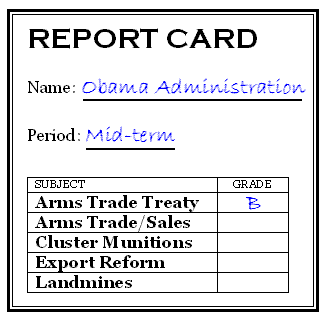By Jeff Abramson
At the end of this month, delegates will meet again at the United Nations to continue work on a legally binding accord to regulate the conventional arms trade. As we launch a week of assessing the Obama administration's conventional arms control record, we begin with:
at the United Nations to continue work on a legally binding accord to regulate the conventional arms trade. As we launch a week of assessing the Obama administration's conventional arms control record, we begin with:
Arms Trade Treaty: B
In 2009, the Obama administration broke with the Bush administration and voted to support the international effort to seek a legally binding global arms trade treaty (ATT). Last year at an ACA co-sponsored event, U.S. delegation head Ambassador Donald Mahley gave an address on behalf of Undersecretary of State Ellen Tauscher making the case for a strong treaty:
We all know that there is a dark side to arms transfers that can have devastating consequences for people and regions.
Irresponsible transfers can support terrorists, enable genocidal, and create, sustain, and compound proliferation nightmares.
The Arms Trade Treaty discussions have gained momentum by a shared recognition of the disruptive and oppressive impact of illicit or ill-advised arms transfers by a number of countries and organizations.
That is why we need to explore a legally binding measure to better control transfers across international borders.
Underlying this welcome rhetoric, however, are a number of stances that prevent the administration from earning the highest grade.
Washington desires to keep ammunition outside the scope of the treaty, even though the United States already regulates its international trade. The administration is hesitating on supporting strong parameter language that might obligate countries to avoid trading with governments that commit human rights abuses, violate international humanitarian law, or generally fail to control arms from impacting human security. Washington also has a reluctance to consider a strong implementing body for the treaty.
These stances only weaken the ability of an eventual treaty to have a meaningful impact in the conflict zones where the unregulated influx of weapons is causing the most harm and undermine what is a generally commendable U.S. approach on the ATT.
------
We're grading the Obama administration all week. Tomorrow's subject: Arms Trade/Sales
Grading Guide
A: Global leader pressing for actions to curb arms races and set or reinforce highest international norms.
B: Working to raise or meet global norms. Breaking with past policies where appropriate.
C: Policies under review and may result in meeting global norms, or undermining them.
D: Falling behind global norms. Actions may exacerbate or create arms races and/or insecurity.
F: Actions undermining global norms and likely contributing to arms races.
